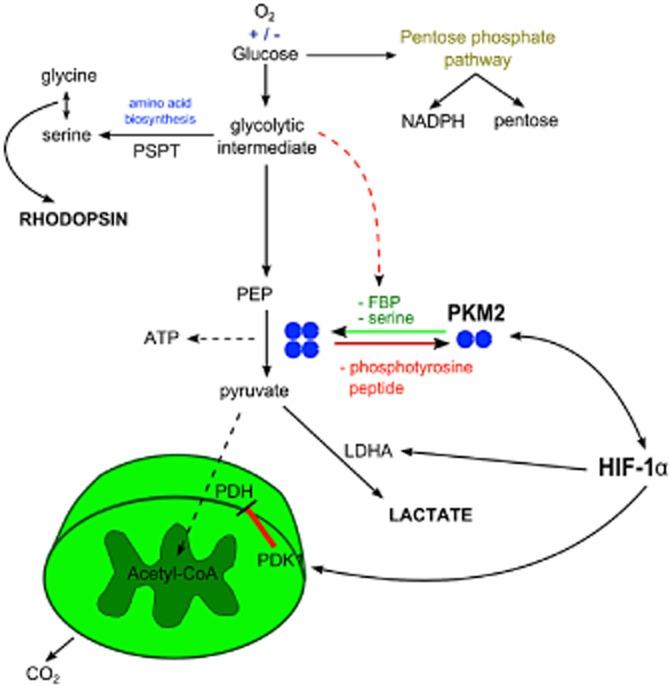Retinal energy metabolism and links to eye disease
Investigate retinal metabolism associated with eye disease in these molecular and biomedical science honours projects.
Glucose metabolism has long been of interest to biochemists, but has undergone a major resurgence in the last few years due to a growing understanding of its important role in cancer, as cancer cells typically display unusual glucose metabolism.

Figure 1
When oxygen is abundant, differentiated cells generate ATP very efficiently from oxygen using oxidative phosphorylation.
However, cancer and other rapidly proliferating cells favour aerobic glycolysis, where glucose is converted to lactate rather than CO2 even in the presence of abundant oxygen (Figure 1). This is known as the Warburg effect and is the basis for PET scans of tumours. The underlying cause is postulated to be a function of the high biosynthetic needs of these proliferating cells.
Cancer metabolism is now a very active field of cancer research, to help understand, diagnose and even therapeutically target cancer cells.
Interestingly, photoreceptor cells in the mammalian retina also display the Warburg effect, even though they do not proliferate. One possible explanation is their high biosynthetic requirements stemming from the constant turnover of the outer segments of these cells. Photoreceptor degeneration and visual impairment have been linked to cellular metabolism, and may relate directly to the Warburg effect.
In addition, new therapeutic approaches designed to target the Warburg effect in cancer may also target the retina, having negative consequences on vision.
We have a number of related projects of direct clinical relevance exploring the metabolism of the retina, in collaboration with Professor Robert Casson, Head of Ophthalmology. The projects cover basic energy metabolism, using both molecular biological, biochemical and even the use of lasers to address clinical questions - cross-disciplinary, translational research!
Projects
- Explore mechanisms controlling the Warburg effect in mammalian retina, and compare them to the mechanisms controlling metabolism in cancer cells. Techniques include immunofluorescence, western blotting, CRISPR-Cas9 and metabolic profiling of retinal cells.
- Preclinical investigation of a novel photobiomodulation laser for retinitis pigmentosa: Effect on mitochondrial energy metabolism and photoreceptor survival. We have a very interesting experimental laser that we believe enhances mitochondrial function in the retina, and this topic will be investigated the use of this device.
- Measuring real-time retinal energy metabolism with fluoresence hyperspectral imaging. This project will use a novel fluorescence hyper spectral retinal camera to measure retinal metabolism in normal and diseased retinas.
Key reference
- Cancer-like metabolism of the mammalian retina. Ng SK, Wood JP, Chidlow G, Han G, Kittipassorn T, Peet DJ, Casson RJ. Clin Exp Ophthalmol.
Study biochemistry
Dr Peet is an Associate Professor in Biochemistry at the University of Adelaide. His research interests are centred on understanding the molecular events within cells that underpin the genomic response to hypoxia.
The cellular response to hypoxia is essential for many physiological processes in normal development and adult physiology, and contributes to the pathophysiology of major human diseases, including cancer, myocardial and cerebral ischaemia, pulmonary hypertension, and wound healing. The key components of this cellular response to hypoxia are a unique family of hydroxylase enzymes that act as the primary oxygen sensors, the Hypoxic Inducible transcription Factors (HIFs) that directly regulate gene expression, and specific target genes that mediate cellular changes.
His research interests extend beyond the HIFs, to the identification and characterisation of novel substrates of the oxygen-sensing hydroxylases. Understanding these processes has major implications for the diagnosis, prognosis and novel therapeutic approaches to treat human disease.

Supervisors
Co-supervisor: Professor Robert Casson
Research area: Biochemistry and molecular biology
Recommended honours enrolment: Honours in Molecular and Biomedical Science
